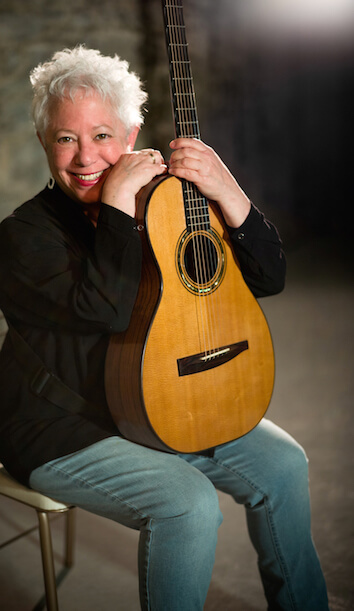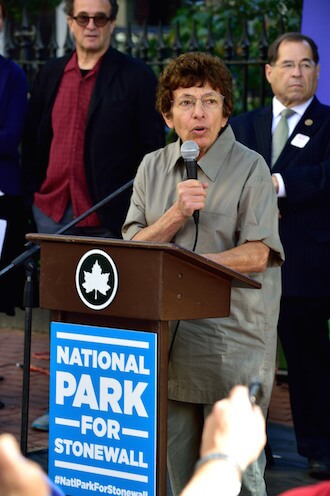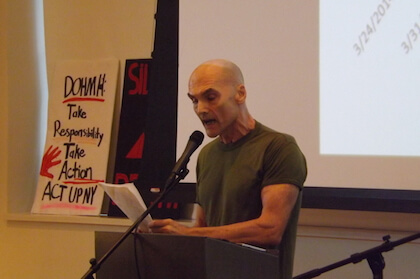Alan Klein mans the bullhorn at an ACT UP demonstration, with artist Keith Haring in the background.
For Alan Klein, a breaking point of sorts came last December with the death of longtime AIDS activist Spencer Cox due to complications related to the virus. The same was true for many others who fought alongside Cox and Klein in ACT UP during the late 1980s and into the ‘90s.
“Some people are markers that stand for so many other people that we lost,” Klein said this week. “If you talk to people at ACT UP, there are always seminal deaths that stand for the deaths of so many others. There is no way for a 20-something’s mind to absorb all those deaths.”
During a weekend early this year in which ACT UP veterans and other friends and family of Cox came together to honor his life and achievements, particularly in the area of treatment advances, Klein and others recognized a powerful bond of shared grief.
ACT UP veterans plan Manhattan gathering six months after a stunning loss
“We realized we missed each other,” he said. “We missed our sense of shared community. It was a healing experience.”
Klein and others talked about those feelings then and have continued doing so since. One result of that dialogue will be a June 22 event at 49 Grove — the ACT UP/NY (Just Don’t Call It a Reunion) Reunion.
The “(Just Don’t Call It a Reunion)” business, Klein explained, has several different meanings. First, ACT UP/NY is still around — and with HIV transmission rates up among gay and bisexual men, the epidemic is not over nor, at least in terms of infections if not survival, is it even in retreat.
Just as importantly, the word “reunion” — especially one that takes place in as slick a venue as 49 Grove — suggests a fleeting social moment in people’s lives, perhaps on par with the evening the aging Weismann Girls shared in Sondheim’s “Follies.”
Klein, who chairs the planning committee for the event, struggled to say specifically what the (Just Don’t Call It a Reunion) Reunion will be and mean, but he and others clearly are thinking about it as something more than simply a bunch of old friends hanging out for an evening.
“In the wake of Spencer’s death, a lot of us from ACT UP realized we were growing apart, moving into middle age,” he said. “It wasn’t only that we were mourning the death of Spencer, but also mourning the loss of this community, and in many cases it was more than a community but also a family.”
Klein suspects that the emotions stirred by Cox’s death are part of a process few would have suspected 20 or more years ago.
“It’s something we went through as young people,” he said. “People in their 20s who had this hope that we could end the AIDS crisis as our friends were dying around us. And suddenly it was gone. We didn’t know we had to deal with this. We didn’t know it would come back.”
Sometimes these sorts of issues are talked about in terms of post-traumatic stress disorder. Sometimes, depression. Sometimes, anxiety disorder.
In fact, eight years ago, Cox himself began to focus in on the aftermath of so much tragedy in the lives of so many young gay men. Founding the Medius Institute for Gay Men’s Health, he sought to examine the role depression, HIV, and aging play in the lives of post-plague gay men and how a holistic response can be crafted. Lack of funding and his own struggles with HIV, depression, and crystal meth use got in the way, but others today hope to pick up the Cox’s research torch. His friend John Voelcker, who co-founded Medius with him, wrote “perhaps now is the time to resuscitate the research that Medius advocated for,” and last month hundreds turned out for a Manhattan town hall meeting to discuss what science can teach gay men about the issues they face.
Alan Klein today works as a strategic communications and public relations consultant.
Klein applauded those efforts, but said they represent “the science side of the coin.” The June 22 event, he said, “is about the feelings themselves.” In discussing an event not steeped in research and empirical results, Klein said he was eager not to offer any pat theories that “pathologize” the emotional experiences of his peers.
“Medius is trying to define what that is,” he said. “I will leave it to the experts.”
Klein needs no expert, however, to tell him that what he has experienced in recent months is profound. “What we’re feeling inside is not a passing emotional pang,” he said, his voice leaving no doubt about the intensity of the feelings.
The goal of the June 22 event is “to create a safe space for people to talk about these serious issues or about what they’ve been doing for the past number of years,” he said. “Maybe it will be a reboot of our experience in ACT UP.”
As a “community building event,” Klein could not say where the reunion might lead. There could be similar events going forward. Or smaller events focused on specific ideas. Or maybe just movie nights out or dinner parties.
But, after a kick-off event that he expects will draw ACT UP veterans from across the country, “We’re going to keep people posted. It’s really exciting in that sense.”
For more information on the ACT UP/NY (Just Don’t Call It a Reunion) Reunion, visit actupnyalumni.org.































